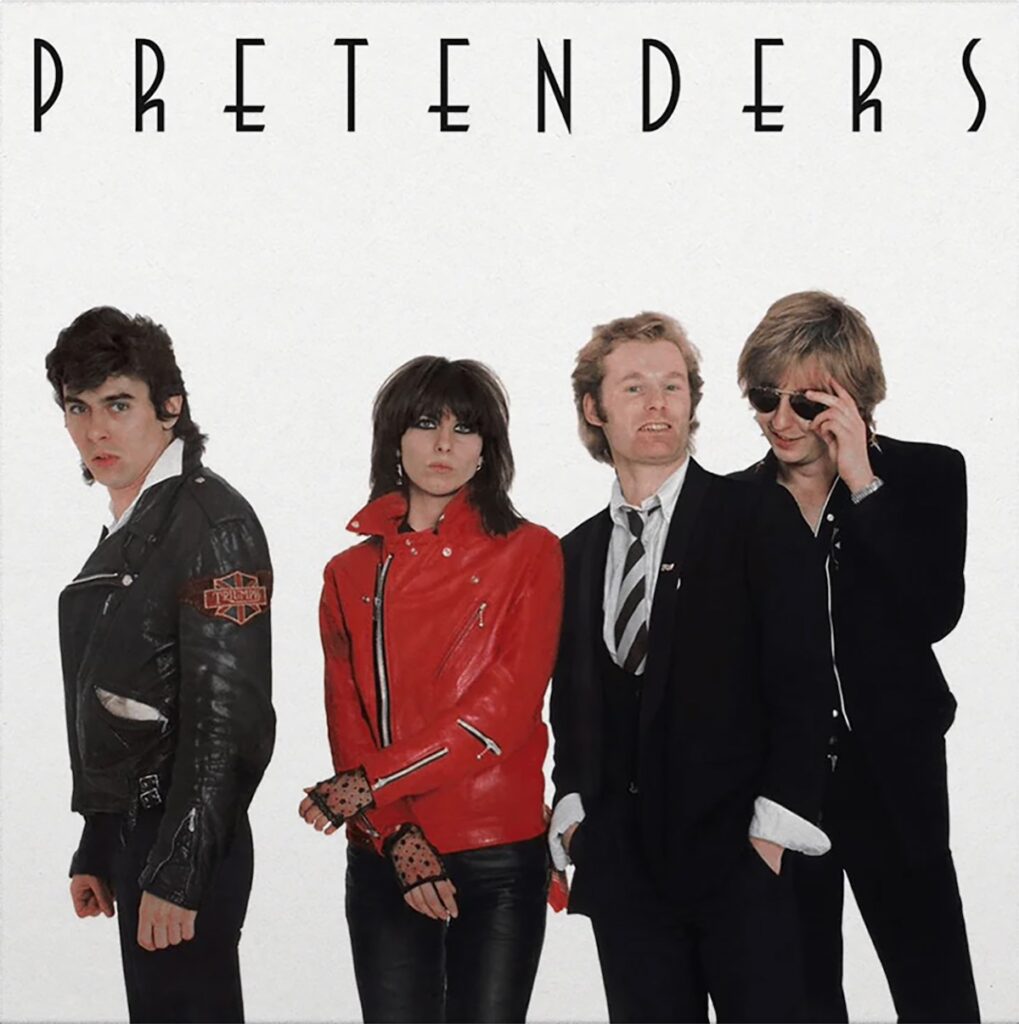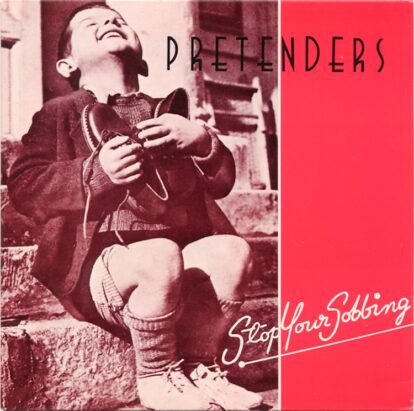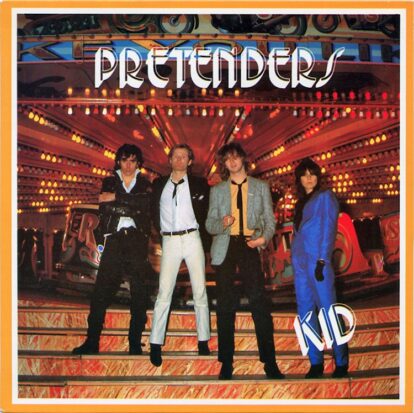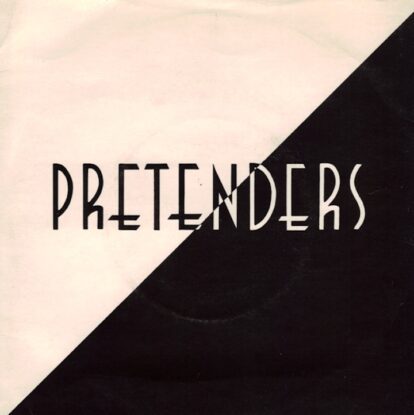
Chrissie Hynde’s quartet The Pretenders arrived straight out of the blocks with a compelling debut album, combining spiky punk attitude, jangle-pop and streetwise lyricism. It’s one of those very rare first records that’s an instant classic…
Just to seal the deal, in the very same week, the group released their long-awaited debut album, simultaneously knocking those other 70s stalwarts, ABBA, off pole position. It was a swift and decisive one-two punch. Pretenders ushered in a new decade, kickstarting a career that continues to resonate to this day. Not bad for a band who, according to the producer of their debut single, “weren’t going anywhere”.
On paper, it was nothing particularly revolutionary – the standard pub-rock line-up of vocals, two guitars, bass and drums. No futuristic synthesizers or drum machines typically associated with the 80s New Wave. If anything, The Pretenders were rooted in tradition, and even derided by some as mere 60s throwbacks, thanks to those jangly guitars and girl-group harmonies.
But the razor-tongued street lyricism was a thoroughly modern, fresh take on the formula. At a time when girls with guitars were still treated with suspicion by their male counterparts, Chrissie Hynde stood front and centre, thrashing out spiky chords on her Telecaster, while spewing vitriol from her potty mouth. Effortlessly cool, Hynde remains a true trailblazer, forging a path in male-dominated territory and doing so on her own terms.
But it wasn’t all full-on, snarling assault; Hynde could coo sweetly, showcasing a candid tenderness beneath the grit. On the singles released for radio, they managed to pull off that age-old subversive trick of wrapping up provocative subject matter in sweet pop melodies, so that half the audience bopping along to Top Of The Pops at home were none the wiser.

Great Pretenders
At first glance, they were an odd bunch: an American woman from the Midwest state of Ohio, and three lanky Englishmen, originating from the ancient county town of Hereford. Not necessarily the most immediate candidates for assembling a streetwise punk collective. But perhaps that small-town sensibility, of pining for something greater and the allure of the big city, was a key part of The Pretenders’ make-up.
Long before The Pretenders broke through, Hynde was already something of a scene veteran, immersed in the London punk crowd since the mid-70s. After a brief stint writing for the NME, she later worked at Malcolm McClaren and Vivienne Westwood’s shop, Sex, crossing paths with many of the key players – even at one point proposing to Johnny Rotten, apparently for that most romantic reason of attaining a work visa.
She was well known, with the right look and the attitude, just searching for the right act to launch her career. Hynde rubbed shoulders with various incarnations of soon-to-be seminal acts in their formative years, including The Clash, The Damned, Sex Pistols and Steve Strange. In another world (one much more rubbish than the one we inhabit), she might have been remembered as one of those infamous scene also-rans, known only for her cameos on the periphery of her contemporaries’ success. By the time of that first Pretenders record, most of her 20s were well behind her, but the steadfast self-conviction had won out, and in time, she would outflank them all.
Last Gang In Town
Make no mistake, The Pretenders were conceived from the start as a vehicle for Hynde. But the band dynamic was equally key to that vision, and integral to their ultimate success. Her manager issued a directive to get a band together, long before they’d settled on a name. There’s no doubting the collective contribution to the classic Pretenders sound; a unique chemistry between the original line-up that would prove hard – nay, impossible – to replicate.
Hynde’s unconventional time signatures on rhythm guitar initially caught her band members off guard, forcing them to come up with their own counting methods simply to keep time. But this became a part of their edge. What’s more, there’s something subtle yet essential in the interplay of Hynde and drummer Martin Chambers. When Hynde is pressing forward with her rhythm guitar, Chambers is hanging back, creating a unique groove. They are pinned together with Pete Farndon’s ever-moving basslines and layered over with James Honeyman-Scott’s inventive jangly guitars.
Hynde lent a fresh voice to a tired format, breathing new life into old tropes and subverting the status quo. She pivots between self-assured, even confrontational swagger and an arresting vulnerability, sometimes in the same song. Despite the punky abrasion, Hynde is never overtly political. The subject matter is more often than not about relationships or, perhaps more accurately, liaisons… and sometimes even confrontations or altercations.

Stop Your Sobbing
That freedom to say whatever the hell she wants is a liberating concept. Though in many ways polar opposites, Hynde shares something with Morrissey, in that both of them could deliver a bolt from nowhere; a razor-sharp, vicious, withering put-down that is as witty as it is deadly. It is that double-take: “Oh, my god, did she actually just say that?” Yes, she really did. In fact, the pair would later collaborate on Shame Is The Name, a bonus track from Morrissey’s 2009 album Years Of Refusal, while his former bandmate Johnny Marr, based his early jangly sound on Honeyman-Scott, and would briefly join The Pretenders in 1987.
To cut a record, Hynde called on her friend, power pop hero Nick Lowe, who was then best known for his production work with Elvis Costello. But Lowe was decidedly unimpressed with her compositions, issuing that immortal line that the songs “weren’t going anywhere”. Lowe, however, conceded that their version of The Kinks’ Stop Your Sobbing was pretty good, and indeed his recording of that one track gave the band their first Top 40 hit, their debut single peaking at a respectable No.34 on the UK charts.
Ultimately, the producer job went to Chris Thomas, both an industry heavyweight and a safe pair of hands. Thomas got his first break producing The Beatles, no less, taking the helm on the ‘White Album’ while his boss, George Martin, went on holiday. He had a foot in both prog and punk, having famously refereed the mixing sessions on The Dark Side Of The Moon and then co-produced the Sex Pistols’ debut album.
Raw Pop-Rock
The sessions were recorded in London’s Wessex and AIR studios. The result, however, was not too overproduced, but more about capturing the moment of a band playing together. It’s raw, edgy and powerful. But it’s considered, too. Honeyman-Scott crafted a signature sound for his catchy solos that he would go away and perfect, note-for-note before laying them down.
To borrow that tired football cliché, Pretenders is very much a game of two halves. The first side is an unrelenting, abrasive assault of chugging guitars and punky rhythms, with opening cuts Precious and The Phone Call particularly keen to demonstrate their punk credentials. The second half, however, is a total change of pace: much slower, more melodic and even, at times, sentimental. As if having proved their mettle, they’re now assured enough to let the bravado drop and showcase their range.
Despite the January 1980 release date, the album was really a child of the 70s, recorded throughout 1978 and 1979, with two Top 40 singles released in that latter year. Whether an intentional stroke of genius or a more mundane result of scheduling (probably the latter), it proved a savvy marketing move in laying claim to being “the first great record of the 1980s”.

Potent New Projects
Classic albums need classic cover art, and Pretenders is no exception. It’s a sleeve you have to pick up just to find out what noise they make. Note Hynde rocking that scarlet red, sharp-shouldered military jacket, predating Michael Jackson’s later imitation on Thriller.
Pretenders was an instant hit, quickly shooting to the top, enjoying both critical plaudits and commercial success. Contemporaries Blondie had a similar trajectory, crossing from the punk clubs to the pop charts with dignity intact, though Hynde is a different beast entirely. Yet despite many gushing reviews claiming epiphany moments, it wasn’t universal acclaim. While some saw it as a genuinely innovative record, others dismissed Pretenders as a mere 1960s throwback – a view perhaps based on the two big singles.
But with the passing of time, it’s one of those records that sounds as fresh and vital as it did on release. Pretenders entered the Grammy Hall of Fame in 2016 and remains a regular fixture on all the retrospective best albums lists. As debuts go, it’s a potent introduction to an exciting new prospect.
Sadly, that original four-piece would never get the chance to fully develop their sound. Within just three years, half the band had fallen, with both Farndon and Honeyman-Scott succumbing to drug-related deaths. That the two still standing would go on have a lasting commercial career is a phenomenal achievement in itself.
THE SONGS
Precious
Pretenders makes its introduction with a driving 4/4 beat and chugging New Wave guitars, a flange effect being the only concession to modern production styles. From the off, Hynde’s tongue is sharpened, spewing about “shitting bricks” and doing it “on the pavement”, followed later by the vitriolic “fuck off!” Hynde’s stop-start delivery, full of affected tics and stutters, emulates that sense of frustrated youth first heard on My Generation. A bold and uncompromising start.
The Phone Call
According to Farndon, “The heaviest fuckin’ punk rocker you could do in 5/4 time.” And true to his word, it’s a gnarly rhythm that even trips the listener up; it’s near impossible to get a hold on the groove. The result is chaotic sounding, and bloody fantastic to boot.
Up The Neck
Opening like that classic Who track (Won’t Get Fooled Again), it drives forwards at a slightly more relaxed pace, with Hynde adding a melodic tone. On first listen, it sounds a bit ploddy in comparison to the earlier assaults. But when you listen closely to the lyrics, it’s obvious this is as weighty as anything on the album that’s come before.
Tattooed Love Boys
A total change of pace for this fast, skittish, punky track. The result is almost akin to skiffle on steroids, charging along like a barn-stormer, with a simple chorus guitar lick, and some of Hynde’s most acerbic lyrical flow on the LP. It’s the song that got several journalists rather hot under the collar, and rightly so.
Space Invader
Whoever said these guys couldn’t play their instruments? This warped instrumental sounds like a classic cop show theme gone awry, with some sharp riffs and innovative textures. It showcases low-slung bass work from Farndon, accentuated by menacing tom-toms played in the introduction from Chambers. The interesting rhythmic ideas show the back-line’s dexterity and originality beyond the straight-up pub-rock template of many contemporaries. Space Invader is a fun workout and, crucially, it’s anotherweapon in the arsenal that elevates the band above the punk also-rans.
The Wait
Straight-up punk, complete with the chugging guitars, yet with those idiosyncratic time signatures designed to trip you up again. Hynde fires out her vocals in a staccato, machine-gun delivery. A fine walking bassline from Farndon keeps it constantly moving. Indeed, it’s the bass that’s responsible for kicking the song into orbit when the chorus arrives. A nice wailing solo from Honeyman-Scott, too.
Stop Your Sobbing
Proto-punks The Kinks were the go-to choice for cover versions by the late-70s New Wave, with everyone from The Jam to The Stranglers celebrating the Brit rockers. Going full circle, Hynde would not only perform the song of her teenage hero, Ray Davies, but then go on to date him and give birth to his daughter. Stop Your Sobbing is something of an outlier, being the only track produced by Nick Lowe, back in 1978 and released a whole year (almost to the day) before the parent album came out. It featured Gerry Mackelduff on drums before Martin Chambers officially completed the line-up. The difference in production style, when compared with the neighbouring tracks, is audibly jarring, sounding much cleaner and more polished. Musically, it’s a bit of a red herring, but a fantastic cover, nonetheless.
Kid
The second single, which stalled at No.33, is another with a 60s group vibe, thanks to its twangy guitar riff straight out of The Shadows’ schoolbook. It’s more jangle pop in the same vein as Stop Your Sobbing. Indeed, the walking bassline and harmonies almost extend further back to 50s doo-wop territory. One of a few tracks where Hynde sings unbridled, adding another dimension, and helping the record from being too one-sided. But again, it’s a subversive move, as underneath the sweet, melodic stylings is a darker undertone of a mother sharing regrets with her young child. Some lovely lead guitar work from Honeyman-Scott in the interludes, while the record’s first introduction of acoustic guitar provides another texture. This was later covered by Everything But The Girl.
Private Life
Many listeners will know this as a Grace Jones track (the third single from her Warm Leatherette LP). Indeed, both songs were released in the same year. And the two must be heard together, as Hynde almost sounds like she’s doing an impression of Jones, in the speak-sing patois she adopts. It’s another unexpected pivot, this time a stripped-back reggae vibe, with lots of space, shuffly drums and dubby bassline. It proves a real showcase for the rhythmic talents of Martin Chambers, knocking out juicy ghost notes with remarkable dexterity. Hynde’s lead vocal loosely weaves in and out of the arrangement, in contrast to the taut and syncopated backing vocals. Again, it’s showing their range. Honeyman-Scott flits between lovely arpeggiated riffs and screaming – almost proggy – guitar solos. The longest track on the LP, it’s allowed the space to breathe.
Brass In Pocket
The biggest hit and most immediate track on the album is bizarrely buried on Side Two in the spot usually reserved for weaker filler. Perhaps because Hynde apparently wasn’t too happy with it; specifically, her vocal performance made her cringe, famously proclaiming it’d be released over her dead body. But she’s still alive, it was released as a single, and it gave them a stonking big No.1. Hynde’s loss is the world’s gain, because Brass In Pocket is, of course, fantastic, and it’s clearly the top vocal performance on the record. Bouncy and mid-tempo, it grooves along on a wave of positivity with shimmering guitar work, and a funky perpetually moving bassline. It holds the honour of being the first new UK No.1 of the new decade, for two weeks in January. Later covered by Suede for an NME compilation.
Lovers Of Today
Another soothing ballad, but with an interesting stop-start arrangement. This gradually builds in intensity, mainly through some stellar guitar work, accentuated by backing vocals that are almost gospel in nature. The arrangement manages to be both understated, yet simultaneously overblown and epic.
Mystery Achievement
Opening with an extended drum intro before Farndon’s bass kicks in, the band bring the intensity back up a notch for the album’s closing track. Some chorus guitars and the overall vibe sound more like The Police, a la Message In A Bottle, which can only be a good thing. Charging along on a straight-up 2/4 punk beat, it’s a rollocking end to a fine album.
For more on The Pretenders click here
The post Classic Album: The Pretenders – Pretenders appeared first on Classic Pop Magazine.
